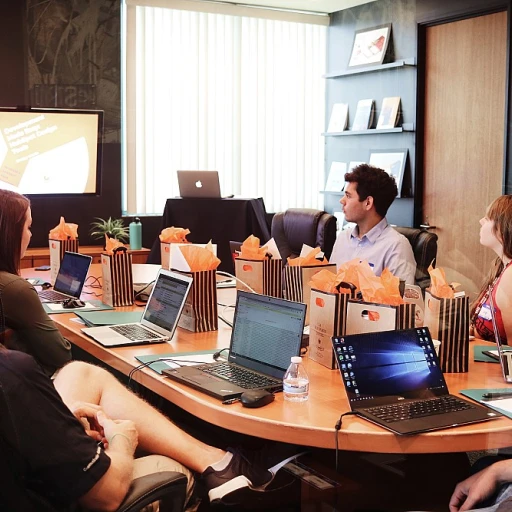What is the Shape Personality Test?
Exploring the Shape Personality Test
The Shape Personality Test is an innovative approach to understanding an individual's unique personality traits. Designed to classify people into distinct categories, this test uses geometric shapes such as circles, squares, triangles, and squiggles to represent different personality types. Each shape signifies a different set of traits and behaviors, offering a fun and engaging way to assess one's characteristics.
At the core of the test is the idea that our personalities can be represented by the "shape" we most identify with. For example, someone who identifies with a circle might be perceived as nurturing and social, while a triangle might indicate leadership and decisiveness. This assessment taps into our innate preferences and communication styles, providing valuable insights into our interpersonal relationships and how we interact with others.
The process involves participants taking a series of questions designed to identify their dominant shape. The results are presented in a comprehensive report that breaks down the candidate's shape-based personality, offering a detailed analysis of their traits. Whether used for self-discovery or as a tool in recruitment, the Shape Personality Test serves as a bridge for better understanding oneself and others.
In the broader scope of candidate experience, personality tests like this play a significant role. They reveal critical insights that can help recruiters match candidates with roles that align with their inherent strengths and contact preferences. Additionally, these tests can improve workplace dynamics by enhancing knowledge of relationship styles, fostering better team compositions that align with unique personalities.
While the test is an excellent tool for gaining deeper insights, it is essential to approach it with certain considerations in mind. The reliability of the results can depend on how well the test is administered and the cultural context in which the shapes find meaning. Understanding these nuances is crucial for maximizing the effectiveness of personality assessments in an organizational setting. For a detailed exploration into broader prehire assessments, you may want to read about enhancing candidate experience with effective prehire assessments
here.
Understanding the Shape Personality Test provides a glimpse into future trends where personality assessments will continue to evolve, reinforcing the importance of the test as part of a comprehensive strategy for improving candidate experience and fostering better workplace relationships.
The Role of Personality Tests in Candidate Experience
The Impact of Personality Tests on Candidate Interactions
The use of personality assessments like the Shape Personality Test plays a pivotal role in enhancing candidate experiences during the hiring process. These tests are not merely about analyzing scores or creating reports; they represent a unique approach to understanding the dynamics between potential employees and organizations.
Personality tests offer a fun and engaging way for candidates to learn more about themselves and how they might fit within a team or company. By employing tools that assess different personality types, employers can help candidates find their shape in the work environment, engaging more seamlessly with peers and forming positive workplace relationships.
One of the key advantages of these assessments is the insight they provide into how a candidate might perform in specific roles. Understanding the unique personality and behavioral styles, such as whether someone is a "circle" or a "squiggle," offers a deeper layer of information that résumés or interviews alone cannot provide. This deeper understanding can ensure candidates find roles where they will excel, leading to greater satisfaction and reduced turnover.
Moreover, when organizations integrate personality tests in candidate experience strategies, they open the door to more personalized and effective communication. Whether through direct contact or more formal media, knowing a candidate's personality style can improve engagement and help forge strong relationships based on mutual understanding and respect.
For more detailed insights into this subject, interested readers can explore how talent acquisition specialists enhance candidate experience through such assessments by reading
this article.
Overall, while the attractiveness of personality tests in the hiring process is clear, companies must be mindful of how these tests align with their broader recruitment strategies and the potential implications they may have on candidate interactions.
Benefits of Using the Shape Personality Test
Exploring the Advantages of a Personality Shape Assessment
The use of personality assessments like the Shape Personality Test in candidate experience processes offers a variety of advantages that both employers and candidates can appreciate. By integrating these tests, organizations can foster deeper understanding of a candidate's unique personality and determine how these traits will fit within their teams and culture.
- Enriching Recruitment Insights: Personality tests provide a structured way to uncover candidates' inherent characteristics, translating into meaningful insights for recruiters. Such insights can be invaluable when seeking to align candidates with the right roles and teams, ultimately contributing to higher levels of employee satisfaction and retention.
- Enhanced Candidate Engagement: The Shape Personality Test introduces a fun, interactive element to the often-dreaded recruitment process. By incorporating shapes like circles and squiggles, candidates may find the evaluation process refreshing and engaging. This can lead to improved applicant experience, as candidates learn more about themselves and how they interact with others.
- Promote Self-awareness: For candidates, personality assessments provide an opportunity for self-reflection. By understanding their own personality shape, individuals can better prepare for the kinds of workplace relationships and roles that will best suit their personal style. This introspective view is beneficial irrespective of the job outcome, fostering personal growth and development.
- Facilitate Better Team Dynamics: For employers, well-interpreted personality reports can aid in assembling work teams with complementary skill sets and personality types. This strategic approach can enhance group dynamics and foster a more productive and harmonious work environment, leveraging the unique strengths of each team member.
Employers and candidates should approach these tests as tools that go beyond traditional hiring metrics. Through continuous refinement and adaptation, companies and recruitment professionals can adapt such assessments to gain deeper insights into potential hires. Further information about how personal attributes play a role in candidate experience can be explored
here.
Challenges and Considerations
Navigating the Challenges and Considerations of Personality Assessments
When it comes to incorporating the Shape Personality Test into the candidate experience, there are several challenges and considerations to keep in mind. While personality assessments offer insightful revelations about candidates' unique personality types and how they might fit into your team, they also require careful handling to ensure their effectiveness and ethical use.
One of the primary challenges is ensuring the test's validity and reliability. Organizations must ascertain that the Shape Personality Test accurately measures what it claims to, which is crucial for maintaining credibility and trust with candidates. This involves thorough research and continual validation processes that can sometimes demand significant time and resources.
Another consideration is the potential bias in assessments. While the Shape Personality Test strives to evaluate candidates objectively through unique shapes and scores, any inherent biases must be acknowledged and addressed. Ensuring that the test is inclusive and fair to all candidates, regardless of their background or personality style, is essential in promoting diversity and equality.
Additionally, candidates' privacy is a significant concern. When people participate in assessments and share personal details, safeguarding their information becomes paramount. Clear communication about how their data will be used, who will have access, and the purpose behind it will help establish trust and foster positive relationships.
Moreover, the context in which personality tests are administered matters. Candidates should understand how these assessments fit into the broader hiring process. Providing a report or feedback will help in making these evaluations feel meaningful rather than just an impersonal assessment.
Despite these challenges, when used thoughtfully, personality assessments can significantly enhance the candidate experience and support the formation of stronger workplace relationships. With a well-strategized approach, organizations can navigate these challenges while maintaining the integrity and purpose of the Shape Personality Test.
Best Practices for Implementing Personality Tests
Optimizing Implementation for Effective Outcomes
When incorporating personality tests like the Shape Personality Test into the candidate experience, several best practices should be followed to ensure the process is smooth and beneficial for all involved.
- Define Clear Objectives: Before implementation, companies should clearly define what they aim to achieve with the personality test. Understanding the goals, whether they are to enhance team dynamics or to better assess cultural fit, will help in the overall alignment of the hiring strategy.
- Choose the Right Assessment Tool: Given the variety of personality assessments available, selecting the appropriate tool, such as the Shape Personality Test, that aligns with your organization's needs is crucial. Each test has its unique focus areas—some may highlight relationship dynamics while others might emphasize individual work styles.
- Understand the Legal Implications: Ensure that the use of such assessments complies with employment laws and regulations. Consulting legal and HR professionals will help avoid potential pitfalls and ensure fair candidate treatment.
- Train Your Team: It’s important that those administering and interpreting the tests are adequately trained. This includes understanding how to read and interpret the results accurately and maintaining a neutral stance.
- Feedback and Transparency: Candidates should be informed about the process and the role that the test scores will play in the hiring decision. Providing feedback can also enrich candidates' experience, offering them insights into their own personality types and areas for personal development.
- Integrate with Other Processes: A personality test should be one of multiple evaluation tools. Balancing it with interviews, reference checks, and skills assessments will provide a holistic view of each candidate.
Implementing personality assessments like shape tests can significantly improve relationships between candidates and employers when done correctly. Emphasizing fun and meaningful contact during the process may turn a standard interaction into a partnership-building exercise that helps both parties learn about potential fit and work styles.
Future Trends in Candidate Experience and Personality Testing
Future Directions in Candidate Experience and Personality Assessments
As organizations increasingly recognize the value of integrating personality assessments into their recruitment processes, the future of candidate experience promises to be more dynamic and insightful. Here’s what to expect:
- Technological Advancements: With the advancement of AI and machine learning, personality tests like the Shape Personality Test are likely to become more sophisticated. These tools will be able to more accurately predict candidate success and fit by analyzing nuanced personality traits.
- Customization and Personalization: Future assessments will likely provide more personalized insights, allowing candidates to gain a deeper understanding of their own unique personality types. This personalization will enhance the relationship between recruiters and applicants, as they can tailor communications and feedback based on specific candidate results.
- Integration with Other Assessments: We may see personality tests being more frequently combined with other assessments, such as cognitive and technical skills tests, to provide a comprehensive overview of a candidate’s potential. This integrated approach will help organizations better understand how a candidate’s personality complements their skills, leading to better hiring decisions.
- Increased Focus on Candidate Experience: As companies continue to prioritize a positive candidate experience, providing transparent and meaningful feedback from personality assessments will be paramount. This will not only help candidates understand their strengths and areas for development but also foster a positive ongoing relationship with potential employers.
- Adapting to Remote Work Contexts: As remote work becomes more prevalent, the emphasis on assessing soft skills through personality shapes will increase. Employers will look for candidates with strong interpersonal and communication skills that are crucial in remote settings.
In conclusion, as we move forward, organizations will need to balance the use of innovative assessments with the human aspect of recruitment. By adapting to new technologies and focusing on personalized feedback, the candidate experience will not only be more engaging but also more effective in identifying the right fit for both parties involved.














